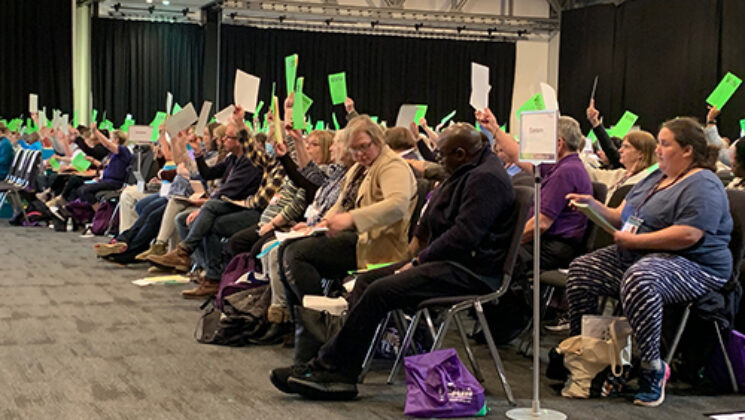For some NHS workers, using a car for their work isn’t a choice. But with the cost of living crisis – including the rise in fuel prices – increasing numbers cannot afford to do that and some are even having to “pay to come to work, or stay at home and call in sick”.
That is the shocking reality for some NHS staff described by Susan Highton, as she moved a motion for the Yorkshire and Humberside region at UNISON’s health conference this afternoon.
Community and district nurses in particular often have to use a car, and those who travel the furthest for their work are disproportionately affected, as more of their miles are covered by a lower rate.
But mileage rates have not been reviewed since 2014. “Surely, it’s time to look at it and time to review it?” said Ms Highton.
Allan Foster from the nursing and midwifery occupational group pointed out that, “the fact that the mileage is calculated ‘as the crow flies’ is an unfair policy”.
Trudi Martin for the executive said that the situation needs to be resolved “as a matter of urgency. UNISON has made representation to the NHS council … as the war in Ukraine and other global issues make the situation worse”.
In her region in the South West, where public transport is poor, she says that staff usually do around 700 miles a month, but are currently doing an average of up to a thousand miles a month due to the staffing crisis.
Because of the current system, that means that, for eight months of the years, they get just 20p a mile for their travel for their work.
Conference backed a range of actions on the issue, including:
- ensuring that fair mileage rates are part of campaigns such as Earnings Max and Fair Pay for Patient Care;
- liaising with elected representatives in all UK governments via the union’s Labour Link;
- encouraging regions and branches to collect evidence of the financial hardship caused by the issue.
In the same session, delegates also backed calls to rectify inequalities on pay and rest that affect those NHS workers who work on-call.
Jon Whitney from University Hospitals Birmingham, moving the motion, told delegates that, when on call, “you stay in at night if you’re on call; you stay in at the weekend if you’re on call”.
However, workers are paid poorly for that time waiting to be called. And he showed conference three Mars bars to illustrate how little he is paid when on call – the price of just two and a half of those.
The executive was instructed to:
- survey members on how on-call pay and conditions negatively affects members’ lives;
- work with staff groups and employers to develop ethical policies on the issue.
On a proper rate of pay for NHS bank work, conference called on the executive to work with the NEC and other unions to campaign for an end to rogue NHS bank arrangements that move away from mirroring Agenda for Change terms and conditions.
Moving the motion, Sam Kimberley from the West Midlands said: “We’re deeply concerned at the race to the bottom. Although it [bank work] is not the solution to the staffing problems, it’s important.
“Bank workers must mirror Agenda for Change terms. If you want people to work extra hours, you need to compensate them properly.”
Dawn Ward from Cymru/Wales noted that: “Bank contracts are, in the main, zero hours contracts. This is an abuse of our Agenda for Change conditions”, while Sean Fleming for the service group executive said that it was “essential that we take proactive steps to deal with this”.

